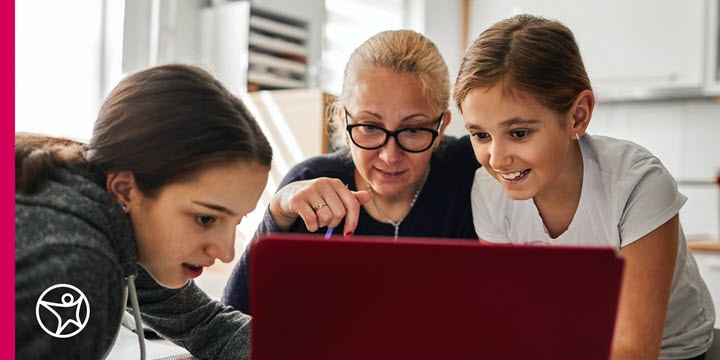Why You Should Transfer Your Student to Online School in the Middle of the Year
byConnections Academy
5 min to read
Traditionally, school follows two conventions: 1) students start in the fall and 2) they learn in a brick-and-mortar classroom setting.
Today, K –12 schooling comes in all shapes and forms—from year-round classes, hybrid learning options, full-time virtual school, and everything in-between. The school choice comes down to what is the right fit for your family. However, sometimes families realize they may need to transfer their student to a different learning environment after the school year has already begun, leaving many asking themselves questions like “schooling options near me” or even “can you transfer schools midyear?”
The good news is that you’re not alone. Many families make the switch to a new tuition-free online public school like Connections Academy midyear and transferring your student may be easier than you think.
5 Reasons to Change Schools Midyear
1. You’ll have support when switching to online school.
If you decide to enroll your child in an online school like Connections Academy, our enrollment specialists are committed to helping you fully understand what you need to do every step of the way. From finding an online school near you to building a class schedule that works for your student’s graduation goals, you’ll have a dedicated support system that can help your student feel prepared for success, connect with their teachers, and find their place in their new school.
2. You’ll be a partner in your child’s education.
Once you are a part of an online school community, you won’t have to wait for parent-teacher conferences or report cards to find out how your child is doing in school. After you become your child’s Learning Coach, you can monitor their daily learning to make sure they complete and understand their lessons. This doesn’t mean you’ll be teaching your student; our certified educators handle that role. But Learning Coaches help structure the learning day, provide support and encouragement, and make sure their students stay on track.
3. You can take advantage of flexible scheduling.
With virtual or online schooling, students learn at home with support from a trusted adult and taught by certified teachers, ensuring they follow a state-approved, public school curriculum that involves independent, computer-based study, and classes that can be completed at any time during the school day. While students still need to meet attendance requirements and follow a typical school year calendar, online schools allow families the flexibility to take when learning happens into their own hands. This means students can complete their math lessons in the morning one day and then complete their math lessons in the evening another day. Many families enjoy the flexibility of online school to accommodate medical appointments, sports practices, community engagement, and personal preference.
4. Transferring schools can help students succeed.
As children grow and become independent, they often have individual needs or desires that aren’t met by the structure of traditional public schools. Sometimes the brick-and-mortar learning environment is not as positive or safe as it should be. An online school allows the flexibility and personalization to meet the needs of each student, whether they are looking for more academic choices, more belonging among their peers, fewer social distractions during class, a healthier learning environment, flexibility required for physical or mental health services, or to meet college and career goals.
5. Enjoy personalized learning opportunities.
No matter what brings your student to virtual learning, there are ways they can take advantage of the personalized learning opportunities to help make school work better for them and their needs. Rather than trying to conform to a one-size-fits-all model that many brick-and-mortar public schools offer, online schools like Connections Academy allow students to learn in the way that best suits them. Students can participate in live class discussions or watch a recording of the classes later so they can go back and rewatch or pause lessons as needed. Many online students also have the option to take classes that may not be available at their brick-and-mortar school, such as dual-enrollment opportunities or credit recovery programs or summer courses to help them get ahead.
How Do I Transfer My Child to Online School?
Choose a high-quality virtual school.
Find out whether there’s a Connections Academy school near you and make sure your child is eligible to enroll. Connections Academy offers free online homeschool with accredited K–12 programs.
Choose your timing.
You can transfer at any time, but changing schools during a semester break is ideal. Most online schools have enrollment deadlines and may not have availability, but if there are reasons to make an immediate switch, our schools’ counselors and enrollment specialists will be able to help you navigate the school transfer smoothly.
How long does it take to transfer to online school?
The full enrollment process typically takes around two weeks from start to finish, but ultimately it depends on how quickly you submit all the appropriate documents.
Gather necessary records.
Check with enrollment officials at the new school to find out what you need to do to enroll. Typical documents you’ll need to enroll in online school include:
School’s application form
Transcripts
Birth certificate
Immunization records
Other state-specific paperwork
Keep the conversation going.
Once you’ve submitted the necessary paperwork for your new online school, you should only have to wait a few weeks for your books and materials to arrive, before you’re all set. In the meantime, make sure you’re available at the email address and phone number you’ve given the school, in case the enrollment team has questions about your application, and be sure to reach out with any questions of your own as you get ready to begin the process. Communication will be key throughout your entire experience, and we’re here to help every step of the way.
Find Your New Online School Today
If your family is considering a student transfer to online school, following these suggestions and this parent-tested advice can help you conquer the learning curve so you can feel at home in no time.
Start by finding an online school that serves your area and learn more about how your child can transfer schools and enjoy the benefits of personalized online learning by reaching out to an enrollment specialist today.
Find Your School For More Transfer-Related Details
Every school is unique. Find out more about your state’s tuition-free Connections Academy supported school.


